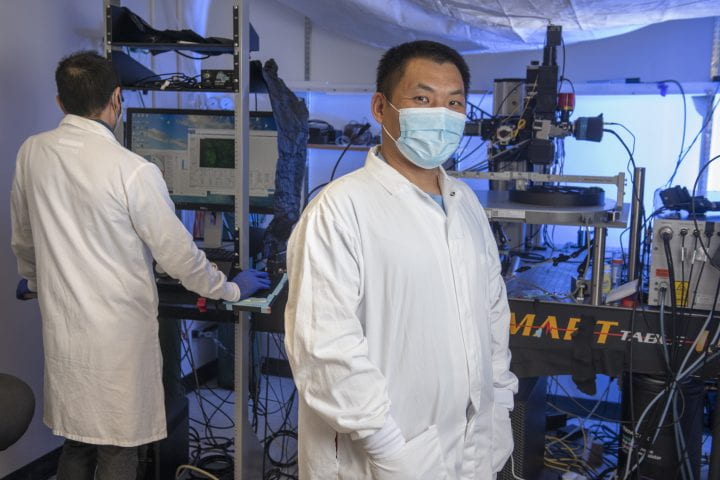UC Irvine to lead multi-institutional study of single-cell vulnerabilities to Alzheimer's disease
Campus awarded $10 million NIH grant to analyze early-stage impact of tau protein deposits

Irvine, Calif., June 15, 2023 — The University of California, Irvine has received a five-year, $10 million grant from the National Institutes of Health to lead a multi-institutional study of specific brain cell vulnerabilities to abnormal tau protein deposits in regions affected in the early stages of Alzheimer’s disease.
“We’re seeking to gain deeper insights into the intricate cellular and spatial molecular changes behind the loss of cells and connectivity that occurs in this disease,” said principal investigator Xiangmin Xu, UCI professor and Chancellor’s Fellow of anatomy & neurobiology and director of the campus’s Center for Neural Circuit Mapping. “This research has the potential to revolutionize our understanding and may pave the way for the development of targeted therapeutic strategies.”
Current literature offers information about the molecular changes in the brain from a heterogeneous cell population perspective. This project will involve the analysis of single cells and specific brain regions in mouse models to discover the mechanisms by which tau protein deposits influence the occurrence of Alzheimer’s and related dementias.
“We will leverage the team’s strong expertise in single-cell and spatial transcriptomics and epigenomics, which are advanced, state-of-the-art techniques in the study of genes within individual cells and the factors that influence their behavior, to gain new biological insights at an unprecedented cellular and spatial resolution. The strong collaborative infrastructure and resources of the CNCM, supported by the School of Medicine and campus Office of Research, will also be critical to this large-scale, multi-institutional project,” Xu said.
Other UCI team members include Kim Green, professor and vice chair of neurobiology and behavior; Grant MacGregor, professor of developmental and cell biology; and Gopi Meenakshisundaram, professor of computer science. Michael Koob, associate professor of laboratory medicine and pathology, and Timothy Ebner, department head and professor of neuroscience, both from the University of Minnesota, as well as Bing Ren, professor of cellular and molecular medicine at UC San Diego, are the other major investigators on the project.
This work is funded by the NIH’s National Institute on Aging under award number 1R01AG082127.
About UCI’s Brilliant Future campaign: Publicly launched on Oct. 4, 2019, the Brilliant Future campaign aims to raise awareness and support for UCI. By engaging 75,000 alumni and garnering $2 billion in philanthropic investment, UCI seeks to reach new heights of excellence in student success, health and wellness, research and more. The School of Medicine plays a vital role in the success of the campaign. Learn more by visiting https://brilliantfuture.uci.edu/uci-school-of-medicine.
About the University of California, Irvine: Founded in 1965, UCI is a member of the prestigious Association of American Universities and is ranked among the nation’s top 10 public universities by U.S. News & World Report. The campus has produced five Nobel laureates and is known for its academic achievement, premier research, innovation and anteater mascot. Led by Chancellor Howard Gillman, UCI has more than 36,000 students and offers 224 degree programs. It’s located in one of the world’s safest and most economically vibrant communities and is Orange County’s second-largest employer, contributing $7 billion annually to the local economy and $8 billion statewide. For more on UCI, visit www.uci.edu.
Media access: Radio programs/stations may, for a fee, use an on-campus ISDN line to interview UCI faculty and experts, subject to availability and university approval. For more UCI news, visit news.uci.edu. Additional resources for journalists may be found at communications.uci.edu/for-journalists.